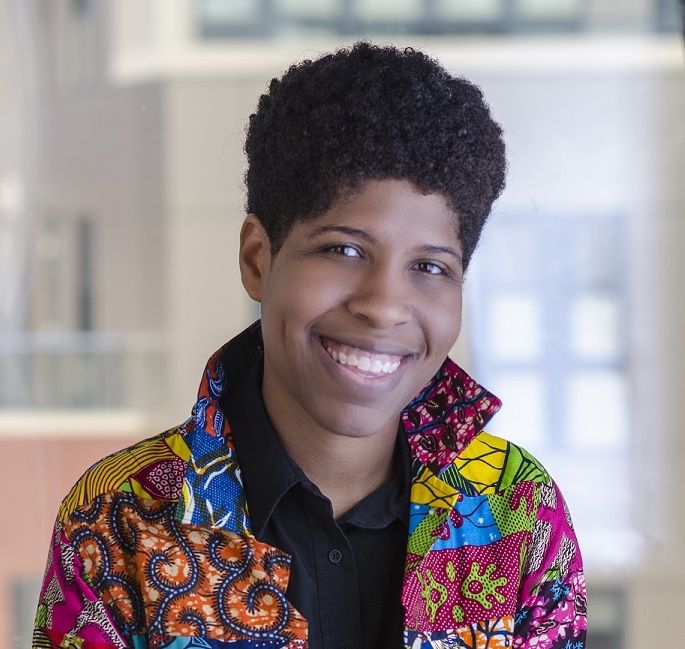
Emma Benn
Where are you from?
I was born and raised in Bryn Mawr, Pennsylvania. It is a suburb of Philadelphia which, like several of the towns in that area, is often referred to as the Main Line.
Please describe an experience (or 2) that helped you discover/ cultivate your interest in the mathematical sciences.
There are many experiences that helped cultivate my interest in the mathematical sciences.
First, I can go back to elementary school where my second grade teacher at Gladwyne Elementary School, Mrs. Allen, would have us compete against each other with the 24 Game. The point of the game is to take four numbers that are given to you and manipulate them arithmetically to yield a total of 24. I gained a lot of confidence playing that game because the boys would often beat most of the girls, but I refused to allow them to beat me. I look back now and think that maybe that experience prepared me quite early to push back against whack gendered norms and expectations in the mathematical sciences.
Second, I always enjoyed my math classes in school. I looked forward to the challenge. Also, my family did everything they could to support my interests in math and the sciences. I can remember when I started getting placed into accelerated math classes, starting in the fourth grade. Whenever I couldn’t figure out how to do something, it became a family affair to figure it out. My dad, nana, ma, and anyone else who happened to step foot in our home while I was working on a challenging math problem would get solicited to try to figure it out. My father would say, “Man, the math she’s doing in fourth grade is harder than any math I’ve ever done in my life.” Eventually, if they couldn’t help me, they would send me off to talk to one of the Bryn Mawr College math professors since we lived in college housing during my elementary and middle school years due to my mother’s employment at the institution. I guess those early interactions with brilliant role models in the mathematical sciences, like Dr. Helen Grundman, placed something within the back of my mind or deep down in my subconscious, that a career as a professor in the mathematical sciences might be a reality for me even though I never met any black mathematicians or statisticians until my undergraduate education at Swarthmore College where I was taught by an amazing and passionate educator and motivator, Dr. Garikai Campbell.
What is/are your most proud accomplishment(s) in regards to your career in the mathematical sciences?
If someone were to ask me this a bit earlier in my career, I would probably respond to them by saying that co-founding Columbia University’s NIH/NHLBI-funded Biostatistics Epidemiology (formerly Enrichment) Summer Training (BEST) Diversity Program to expose underrepresented and economically disadvantaged undergraduates to biostatistics and its applications in cardiovascular health and public health, more generally, would be my biggest accomplishment. I must say that the BEST Diversity Program really was an extremely rewarding experience for me and the 100+ students that have gone through the program.
However, at this stage, I think sometimes it is the little things that make me proud in my career. It’s the one-on-one mentoring experiences with students, often underrepresented, who I get to watch grow from being interested in math or statistics but lacking confidence or in many cases lacking exposure to educational pathways and career opportunities available to them to becoming brilliant, confident leaders and role models in the mathematical sciences who go on to motivate and mentor others. So many amazing mentors, predominately women, have been so instrumental in my success, like Dr. Kim Sellers, Dr. Monica Jackson, Dr. Dionne Price, Dr. Dionne Swift, Dr. Melissa Begg, Dr. Leslie McClure, Dr. Scarlett Bellamy, Dr. Wendy Martinez, Ms. Donna LaLonde, Dr. Loni Tabb, Dr. Melody Goodman, Dr. Felicity Enders, Dr. Annetine Gelijns, and Dr. Amanda Golbeck, so it makes me really proud when I have the opportunity to be a contributor to someone else’s success.
What is/are your most proud accomplishment(s) in regards to your personal life?
One of the proudest accomplishments in my life was something as simple as completing a long walk. Actually the walk was not that long, but each step meant something for me. I was hesitant to even participate in the walk and did not know what to expect, but my wife and good friend reminded me that I would not do this walk alone. They would be beside me. So, in October 2018, only a couple months after completing seven weeks of radiation, I did my first Breast Cancer walk in Central Park. It was difficult because I had to deal with a lot of emotions. They put a sash around me that said “Survivor,” but I had never referred to myself with that term before. I had to sit with it for a bit. Yet, as my wife and friend walked with me, we cried and laughed and cried and laughed. Other survivors would just walk up to me and congratulate me and all of a sudden, it clicked. I wasn’t alone. Yes, the proudest accomplishment of my life was walking into the realization that I’m never truly alone.
Please share some words of wisdom/inspiration.
I think that the competitive nature of our educational pursuits in the mathematical sciences can make us assume that if we are not the best, then there is no place for us. I struggled with this quite a bit even into my career in academic medicine as a biostatistician. However, I want to encourage those who are still questioning whether they belong. I want them to know that they will find their place, eventually. Just stay the course.
